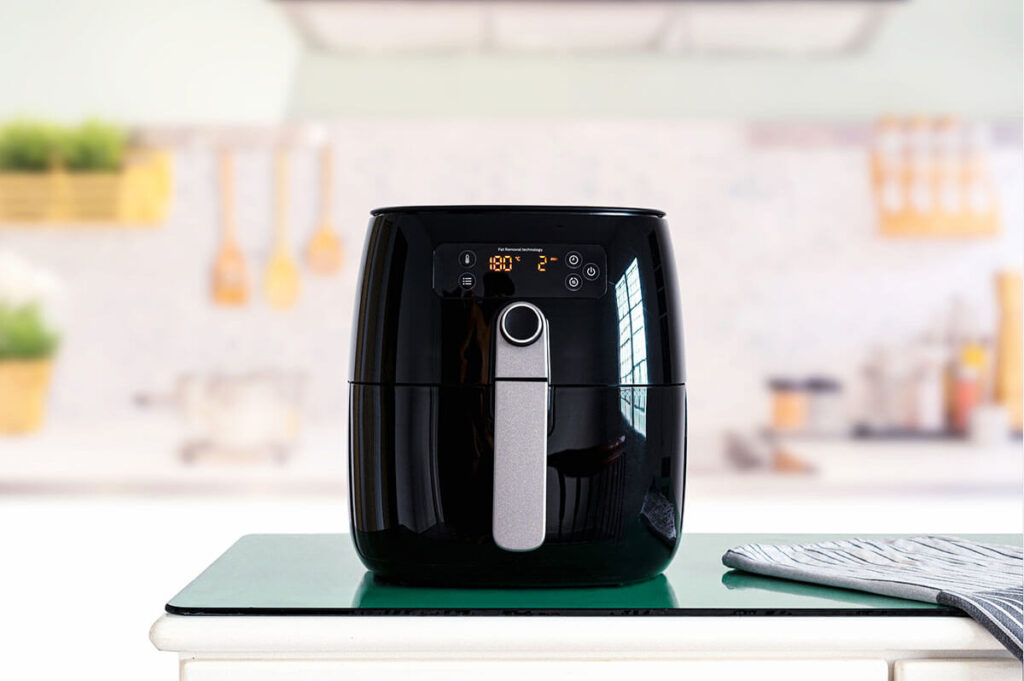Hello Everyone, In recent years, the culinary world has seen a surge in the popularity of air fryers, promising crispy and delicious meals with minimal oil. However, amidst the excitement, questions have emerged about the safety of these appliances.
Are air fryers toxic? In this article, we will delve into the science behind air fryers, examining their potential health implications and dispelling any misconceptions. Rest assured, we’ll provide you with reliable information in a humanized manner, helping you make an informed decision for yourself and your loved ones.
Understanding Air Fryer Basics

Before we dive into the safety concerns, let’s first understand what air fryers are and how they work. Air fryers are kitchen appliances that use hot air circulation to cook food. They employ a heating element and a fan to rapidly circulate the hot air around the food, creating a crispy outer layer similar to deep-frying, but with significantly less oil.
Debunking the Toxicity Myth
One of the major concerns that have arisen regarding air fryers is the notion that they might produce toxic compounds when cooking. However, scientific evidence suggests otherwise. When used properly and at appropriate temperatures, air fryers do not pose a significant risk of producing toxic substances.
Acrylamide, a chemical compound that forms when certain foods are cooked at high temperatures, has been a focus of concern. It’s worth noting that acrylamide can form in various cooking methods, not just in air fryers. Potatoes, for instance, can contain acrylamide when baked, fried, or roasted. To minimize acrylamide formation, it’s recommended to avoid overcooking foods and to soak potato slices before air frying.
Healthier Cooking with Less Oil
Air fryers offer a healthier alternative to traditional deep-frying by requiring significantly less oil. This reduction in oil consumption can have positive health implications, such as lowering calorie intake and reducing the risk of certain health issues, including heart disease and obesity. Additionally, air frying helps retain the natural flavors and nutrients of foods, making them a valuable addition to a balanced diet.
Tips for Safe Usage
To ensure the safe and optimal use of your air fryer, consider the following tips:
- Proper Preheating: Preheat the air fryer before placing food inside. This helps in even cooking and prevents the food from sticking to the basket.
- Appropriate Temperatures: Follow recipe guidelines for cooking temperatures and durations. Cooking at excessively high temperatures may lead to the production of potentially harmful compounds.
- Variety is Key: Don’t rely solely on air-fried foods. A balanced diet includes a variety of cooking methods and food types.
- Ventilation: Use the air fryer in a well-ventilated area to prevent the accumulation of smoke and odors.
How can I reduce the risks of using an air fryer?
Reducing the Risks of Using an Air Fryer: Your Safety Guide
Embracing the trend of air fryers in your kitchen can be both exciting and health-conscious. To ensure you enjoy their benefits while minimizing any potential risks, here are some practical tips that you can follow:
**1. Read the Manual Thoroughly: Start by reading the user manual that comes with your air fryer. Each model can have unique features and usage instructions. Understanding these details will help you make the most of your appliance safely.
**2. Choose the Right Cooking Oil: While air fryers inherently require less oil, it’s essential to choose the right type. Opt for oils with high smoke points, such as canola, avocado, or peanut oil. This prevents the oil from breaking down at high temperatures and releasing harmful compounds.
**3. Avoid Overcrowding: It might be tempting to load up the air fryer basket to cook more in one go, but overcrowding can hinder proper air circulation. This may lead to uneven cooking and potentially even unsafe temperatures. Opt for smaller batches to ensure thorough cooking.
**4. Monitor the Cooking Process: Just like any other cooking method, keeping an eye on the cooking process is crucial. Regularly check the progress of your food to prevent overcooking or burning. This not only ensures a delicious meal but also prevents the risk of producing undesirable compounds.
**5. Use Heat-Resistant Utensils: When interacting with your air fryer, make sure to use utensils and accessories that are heat-resistant and compatible with the appliance. Avoid using plastic utensils or containers that could melt or release harmful chemicals at high temperatures.
**6. Ventilation is Key: Air fryers can sometimes produce smoke or odors, especially when cooking foods with high-fat content. Using your air fryer in a well-ventilated area, such as near a kitchen window or under a range hood, helps prevent any potential buildup of fumes.
Should I use an air fryer?
The sizzle of hot oil and the alluring aroma of fried foods have long held a special place in our gustatory experiences. Enter the air fryer – a modern kitchen appliance that promises to replicate the crispy textures and savory flavors of fried foods with a fraction of the oil. But is it worth the hype? Let’s embark on an exploration of the factors that can help you determine whether an air fryer deserves a spot in your culinary repertoire.
1. Healthier Eating, Crispy Results: If you’ve been on a quest to adopt a healthier lifestyle without bidding adieu to the delightful crunch of fried delicacies, an air fryer could be your ally. By using convection cooking technology, these appliances circulate hot air around the food, achieving that sought-after crispiness without the heavy use of oil. The result? Lower fat content, reduced calorie intake, and a potential reduction in certain health risks associated with excessive oil consumption.
2. Time-Saving Convenience: In our fast-paced lives, convenience often reigns supreme. The air fryer steps up to the plate with its swift cooking times and hassle-free operation. Preheating is a breeze, and the even heat distribution ensures your food is cooked thoroughly. Plus, the absence of excessive oil means less post-cooking cleanup, saving you precious time in the kitchen.
3. Culinary Creativity Unleashed: While the name might imply a sole focus on frying, these versatile appliances are capable of much more. Roasting, baking, grilling, and even reheating leftovers are all within their wheelhouse. This adaptability can open doors to culinary experimentation, allowing you to explore a diverse range of dishes without cluttering your kitchen with numerous gadgets.
4. Mindful Consumption: It’s worth noting that while air fryers are a healthier alternative to traditional frying, they don’t magically transform all foods into nutritional powerhouses. Highly processed or heavily breaded foods will still lack the nutritional benefits of whole, unprocessed ingredients. As with any dietary decision, mindful consumption is key.
5. Consideration for Space and Investment: The decision to introduce an air fryer into your kitchen should also consider practical aspects. If you have limited countertop space, it’s worth evaluating whether the appliance’s size aligns with your available room. Additionally, air fryers come in a range of price points, so finding one that suits your budget is also crucial.
6. Learning and Adaptation: Like any new addition to your culinary toolkit, mastering the art of air frying may require a learning curve. Different foods might demand varied cooking times and techniques. However, this learning process can lead to culinary growth and the discovery of new flavors and textures.
Final Thoughts As you stand at the crossroads of adopting an air fryer, weigh the benefits of healthier cooking, time-saving convenience, culinary experimentation, and mindful consumption against the investment and learning curve. The decision ultimately boils down to your unique lifestyle, preferences, and culinary aspirations. An air fryer can be a tool to elevate your cooking game, but its role should be integrated thoughtfully into your broader approach to food and well-being.
Must Read:-
Conclusion
In conclusion, air fryers are not toxic when used correctly and within recommended guidelines. They provide a convenient and healthier cooking option, reducing the need for excessive oil while maintaining the delicious taste and texture of fried foods. By understanding the basics of air fryer operation and following safe cooking practices, you can enjoy the benefits of this modern kitchen appliance without worry. As with any kitchen tool, moderation and proper usage are key.

